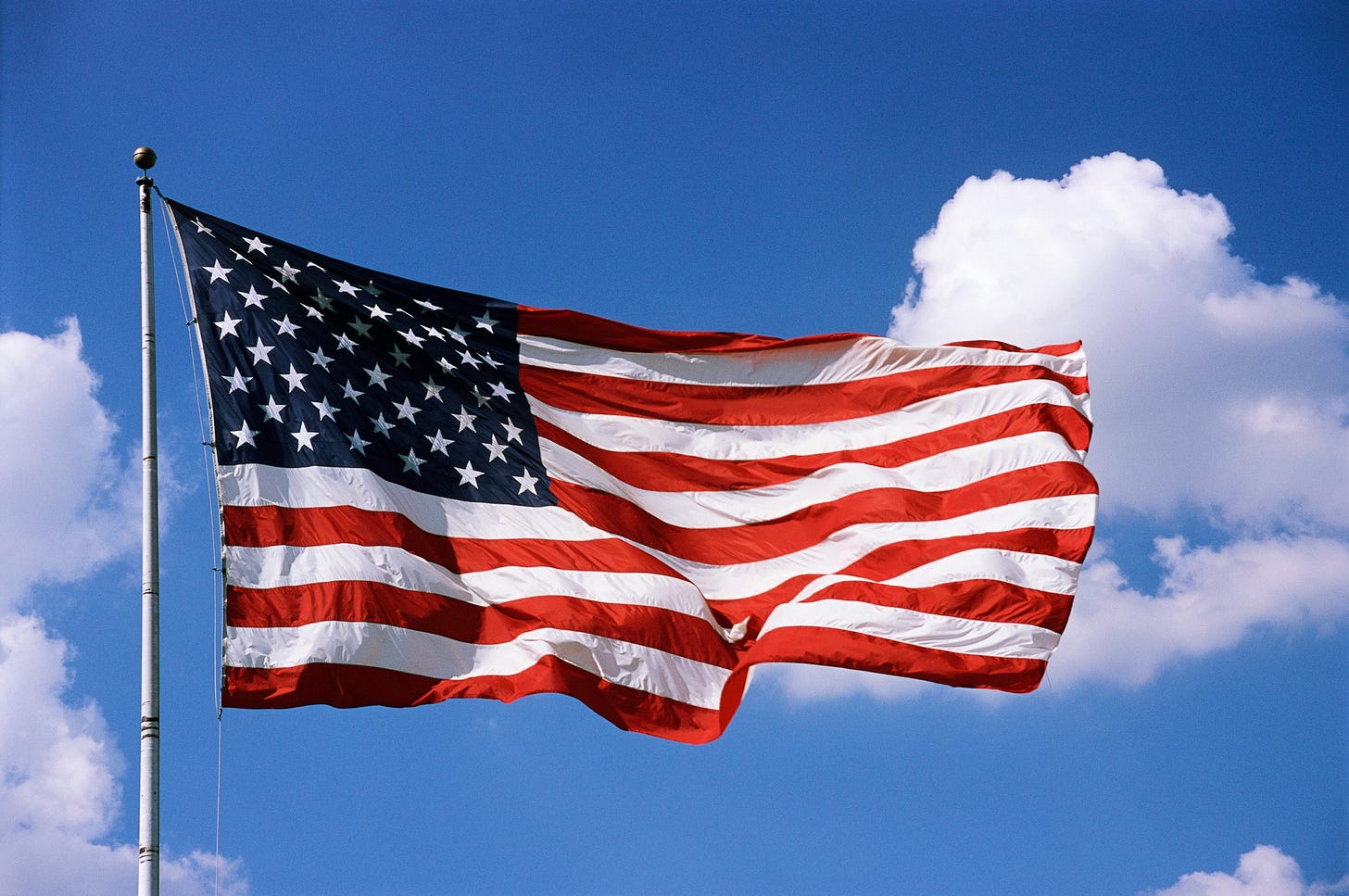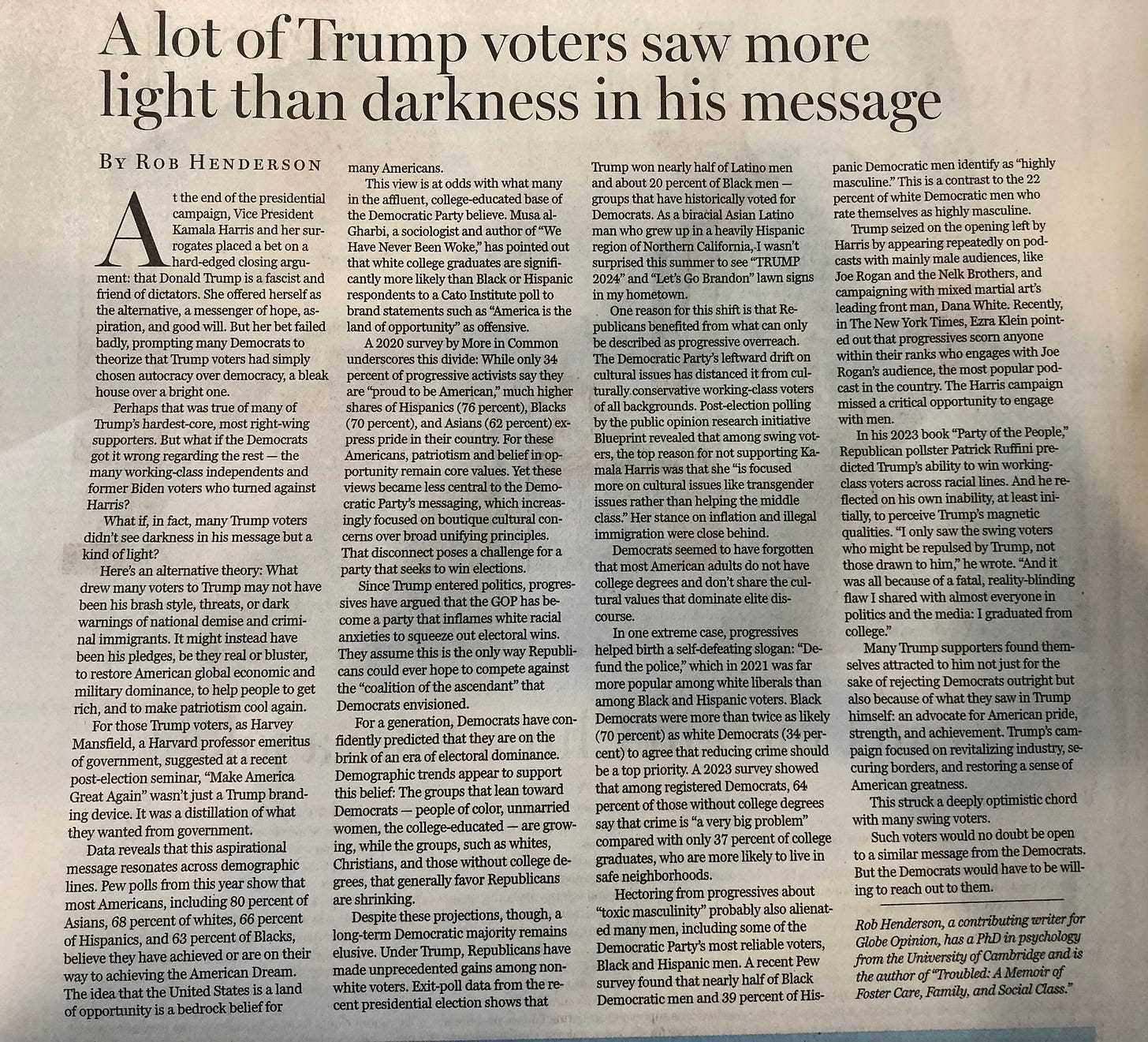What Working-Class Voters Wanted
Not luxury beliefs
At the end of the presidential campaign, Vice President Kamala Harris and her surrogates placed a bet on a hard-edged closing argument: that Donald Trump is a fascist and friend of dictators. She offered herself as the alternative, a messenger of hope, aspiration, and good will. But her bet failed badly, prompting many Democrats to theorize that Trump voters had simply chosen autocracy over democracy, a bleak house over a bright one.
Perhaps that was true of many of Trump’s hardest-core, most right-wing supporters. But what if the Democrats got it wrong regarding the rest — the many working-class independents and former Biden voters who turned against Harris?
What if, in fact, many Trump voters didn’t see darkness in his message but a kind of light?
Here’s an alternative theory: What drew many voters to Trump may not have been his brash style, threats, or dark warnings of national demise and criminal immigrants. It might instead have been his pledges, be they real or bluster, to restore American global economic and military dominance, to help people to get rich, and to make patriotism cool again.
For those Trump voters, as Harvey Mansfield, a Harvard professor emeritus of government, suggested at a recent post-election seminar, “Make America Great Again” wasn’t just a Trump branding device. It was a distillation of what they wanted from government.
Data reveals that this aspirational message resonates across demographic lines. Pew polls from this year show that most Americans, including 80 percent of Asians, 68 percent of whites, 66 percent of Hispanics, and 63 percent of Blacks, believe they have achieved or are on their way to achieving the American Dream. The idea that the United States is a land of opportunity is a bedrock belief for many Americans.
This view is at odds with what many in the affluent, college-educated base of the Democratic Party believe. Musa al-Gharbi, a sociologist and author of “We Have Never Been Woke,” has pointed out that white college graduates are significantly more likely than Black or Hispanic respondents to a Cato Institute poll to brand statements such as “America is the land of opportunity” as offensive.
A 2020 survey by More in Common underscores this divide: While only 34 percent of progressive activists say they are “proud to be American,” much higher shares of Hispanics (76 percent), Blacks (70 percent), and Asians (62 percent) express pride in their country. For these Americans, patriotism and belief in opportunity remain core values. Yet these views became less central to the Democratic Party’s messaging, which increasingly focused on boutique cultural concerns (luxury beliefs) over broad, unifying principles. That disconnect poses a challenge for a party that seeks to win elections.
Since Trump entered politics, progressives have argued that the GOP has become a party that inflames white racial anxieties to squeeze out electoral wins. They assume this is the only way Republicans could ever hope to compete against the “coalition of the ascendant” that Democrats envisioned.
For a generation, Democrats have confidently predicted that they are on the brink of an era of electoral dominance. Demographic trends appear to support this belief: The groups that lean toward Democrats — people of color, unmarried women, the college-educated — are growing, while the groups, such as whites, Christians, and those without college degrees, that generally favor Republicans are shrinking.
Despite these projections, though, a long-term Democratic majority remains elusive. Under Trump, Republicans have made unprecedented gains among nonwhite voters. Exit-poll data from the recent presidential election shows that Trump won more than half of Latino men and about 20 percent of Black men — groups that have historically voted for Democrats. As a biracial Asian Latino man who grew up in a blue-collar, heavily Hispanic region of Northern California, I wasn’t surprised this summer to see “TRUMP 2024″ and “Let’s Go Brandon” lawn signs in my hometown.
One reason for this shift is that Republicans benefited from what can only be described as progressive overreach. The Democratic Party’s leftward drift on cultural issues has distanced it from culturally conservative working-class voters of all backgrounds. Post-election polling by the public opinion research initiative Blueprint revealed that among swing voters, the top reason for not supporting Kamala Harris was that she “is focused more on cultural issues like transgender issues rather than helping the middle class.” Her stance on inflation and illegal immigration were close behind.
Democrats seemed to have forgotten that most American adults do not have college degrees and don’t share the cultural values that dominate elite discourse. In his book The Meritocracy Trap, Yale Law School professor Daniel Markovitz observes that “Widespread evidence underwrites the common wisdom that the rich are socially progressive. A meta-study of hundreds of broad surveys of Americans’ values concludes that Americans in the top fifth (roughly) of the income distribution display more liberal attitudes than their less well-off compatriots.” Many of these socially progressive attitudes have evolved into boutique concerns (luxury beliefs) that attract attention at the expense of issues that matter to most voters is backfiring.
In one extreme case, progressives helped birth a self-defeating slogan (and luxury belief): “Defund the police,” which in 2021 was far more popular among white liberals than among Black and Hispanic voters. Black Democrats were more than twice as likely (70 percent) as white Democrats (34 percent) to agree that reducing crime should be a top priority. A 2023 survey showed that among registered Democrats, 64 percent of those without college degrees say that crime is “a very big problem” compared with only 37 percent of college graduates, who are more likely to live in safe neighborhoods.
Hectoring from progressives about “toxic masculinity” probably also alienated many men, including some of the Democratic Party’s most reliable voters, Black and Hispanic men. A recent Pew survey found that nearly half of Black Democratic men and 39 percent of Hispanic Democratic men identify as “highly masculine.” This is a contrast to the 22 percent of white Democratic men who rate themselves as highly masculine.
Trump seized on the opening left by Harris by appearing repeatedly on podcasts with mainly male audiences, like Joe Rogan and the Nelk Brothers, and campaigning with mixed martial art’s leading front man, Dana White. Recently, in The New York Times, Ezra Klein pointed out that progressives scorn anyone within their ranks who engages with Joe Rogan’s audience, the most popular podcast in the country. The Harris campaign missed a critical opportunity to engage with men.
In his 2023 book “Party of the People,” Republican pollster Patrick Ruffini predicted Trump’s ability to win working-class voters across racial lines. And he reflected on his own inability, at least initially, to perceive Trump’s magnetic qualities. “I only saw the swing voters who might be repulsed by Trump, not those drawn to him,” he wrote. “And it was all because of a fatal, reality-blinding flaw I shared with almost everyone in politics and the media: I graduated from college.”
Many Trump supporters found themselves attracted to him not just for the sake of rejecting Democrats outright but also because of what they saw in Trump himself: an advocate for American pride, strength, and achievement. Trump’s campaign focused on revitalizing industry, securing borders, and restoring a sense of American greatness. This struck a deeply optimistic chord with many swing voters.
Such voters would no doubt be open to a similar message from the Democrats. But the Democrats would have to be willing to reach out to them.
This article was originally published by the Boston Globe under the title “A lot of Trump voters saw more light than darkness in his message.”




I was born working class, got a PhD, and married “up.” I also voted for Trump. One thing that never gets mentioned is his humor. The nicknames, the hyperbole - it’s what I, and I expect a lot of his voters - grew up with. Part of what’s so off-putting about Harris & Co is the complete *lack* of anything resembling a sense of humor.
“Democrats to theorize that Trump voters had simply chosen autocracy over democracy, a bleak house over a bright one.
Perhaps that was true of many of Trump’s hardest-core, most right-wing supporters. “
Rob, that is garbage. Don’t even dignify that slur with speculative credibility. Dems are the party of censorship, which is autocratic. Trump will end that, which supports individual freedom. Dem claims to reverse that dynamic are lies, and voters realuze that. Let that sink in.